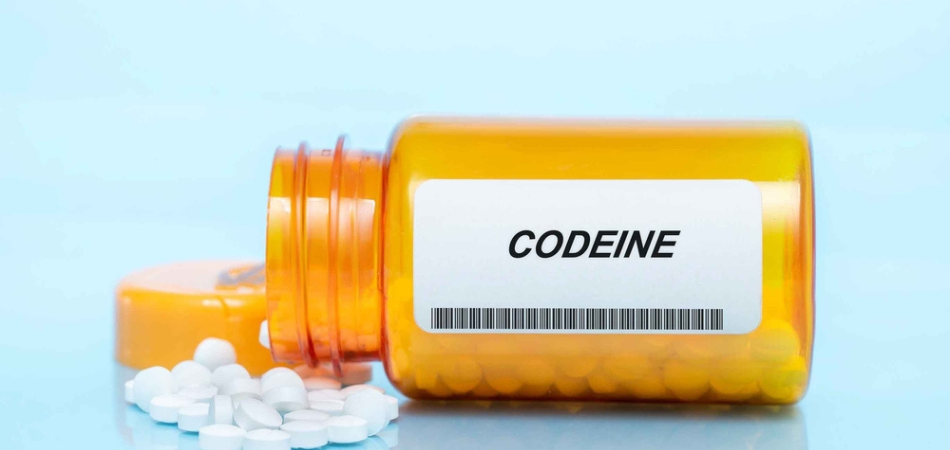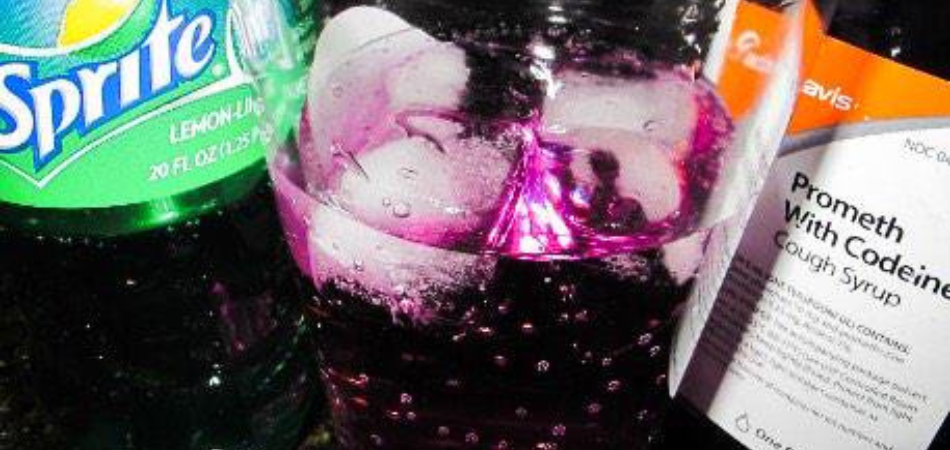How to recognise the dangers of mixing codeine and alcohol
Last Updated:
March 27th, 2025
While the action of mixing codeine and alcohol for its pleasurable effects isn’t a new practice, the combination has certainly seen a resurgence in popularity over the past few years. From NFL players to rappers, to university students, the usage of codeine and alcohol doesn’t seem to discriminate by age or class. But does this make it safe?
This guide delves into the hazards associated with the use of alcohol and codeine, shedding light on the potential risks involved. It also provides valuable insights on seeking appropriate treatment for those suffering from codeine and alcohol abuse, offering assistance to those in need.

What is Codeine?
Codeine is an opioid medication commonly used to relieve pain and suppress coughing. As a naturally occurring substance extracted from the opium poppy, codeine is classified as a narcotic. Codeine’s main function is to change pain perception by binding to receptors in the central nervous system, reducing discomfort. This makes it valuable for treating various conditions associated with pain.
Medical professionals often prescribe codeine for conditions like postoperative pain, injury-related discomfort and certain respiratory issues. Its use is part of a comprehensive pain management plan tailored to individual patient needs. However, it’s crucial to be aware that, like other opioids, codeine has potential risks and side effects, requiring careful monitoring by healthcare professionals.
Why do people mix Codeine with alcohol?
The combination of codeine and alcohol is sometimes sought after for the enhanced euphoric effects it can produce. Below, we take a closer look at common factors that cause people to mix codeine and alcohol:
Enhanced euphoria
Both Codeine and alcohol are known for their sedative and euphoric effects. Combining them can lead to a heightened sense of relaxation and pleasure.
Synergistic effect
Both substances’ central nervous system depressant properties create a synergistic effect, intensifying the overall impact on the body and mind.
Increased sedation
The combination can enhance feelings of sedation and drowsiness, providing a more pronounced calming effect.
Self-medication
People might self-medicate with this combination to alleviate physical or emotional pain due to the powerful effects of the two substances
Social and recreational use
Some people may mix codeine and alcohol in social settings, as it is perceived as a way to enhance the enjoyment of social activities.
Ignorance of risks
Lack of awareness regarding the dangerous interactions between codeine and alcohol may lead individuals to mix them without fully understanding the potential harm. People may have encountered the concoction being misused in pop culture, where a distinctive combination of candies, codeine, alcohol and soft drinks comes together, creating what is commonly known as Lean.
Lean, Purple Drank, Sizzurp
Lean, Purple Drank and Sizzurp are colloquial terms that refer to recreational concoctions made by combining Codeine-based cough syrup with soda and often candy. While the mixture of the two has been used for decades, it was popularised in hip-hop culture and by rappers such as Lil Wayne. Unfortunately, Lean has become a symbol of substance misuse. The trend raises concerns about the normalisation of combining Codeine with other substances, particularly alcohol.
The dangers of mixing Codeine with alcohol
In this section, we take a closer look at the codeine and alcohol side effects, including the short-term and long-term effects:
Short term effects of mixing Codeine and alcohol
Long term effects of mixing codeine and alcohol
Continued misuse of Codeine and alcohol can result in long-term health consequences, such as liver damage, gastrointestinal issues and addiction. Chronic use may lead to tolerance, requiring higher doses for the same effects, increasing the risk of a fatal overdose.
Fatal overdose from mixing codeine and alcohol
Perhaps the most severe short-term and long-term risk is the potential for a fatal overdose. Both substances depress the central nervous system, slowing down vital functions such as breathing and heart rate. An overdose can lead to respiratory failure, coma, or death.
Does mixing Codeine and alcohol affect mental health?
The combination of Codeine and alcohol can lead to a whole range of effects on mental health that extend beyond the initial feelings of euphoria. While the immediate effects may seem pleasurable to some, the long-term consequences can be severe and detrimental:
Will I immediately form mental health issues if I take Codeine and alcohol?
While it’s unlikely that the combination will have a lasting effect on your mental health with short-term, recreational use, prolonged and repeated use of codeine and alcohol can potentially lead to the cumulative deterioration of mental health over time.
People with a predisposition to mental health conditions may find that the combination exacerbates their symptoms, increasing the risk of developing more severe psychological disorders.
How can I be safe around Codeine and alcohol?
With a drug as popular and available as alcohol and prescription drugs as accessible as Codeine, there could be the chance of the two being unintentionally mixed. Here are some scenarios in which this could happen:
- Unintentional mixing can occur when individuals are not fully aware of the potential interactions between Codeine and alcohol.
- Forgetfulness about specific warnings from healthcare providers can lead to accidental co-consumption of Codeine and alcohol.
- Individuals under the influence of Codeine or alcohol may have impaired judgement, increasing the likelihood of unintentional mixing.
- Misunderstandings or miscommunication between healthcare providers and patients can confuse the risks of combining codeine and alcohol.
- Absence of clear warning labels on medications may contribute to unintentional mixing, as individuals may not be adequately informed about potential dangers.
So, what can you do to avoid these easy-to-make mistakes? Below, we provide tips on how you can prevent accidents from happening:
- Stay informed about the potential interactions between codeine and alcohol. Be proactive in learning about the risks associated with their combination. Understanding the effects, side effects, and potential dangers can help you make informed decisions and avoid unintentional mixing.
- Always adhere to the guidance and warnings provided by your healthcare provider. If you have been prescribed codeine or any medication, make sure to discuss its compatibility with alcohol. Follow the recommended dosage and timing, and never hesitate to clarify doubts or concerns with your healthcare professional.
- Be mindful of your alcohol and Codeine consumption. Avoid impulsive or excessive use of either substance. Practice moderation and be aware of your limits.
- Ensure open and clear communication with your healthcare providers. If you are prescribed Codeine or any medication, explicitly discuss your alcohol consumption habits. Provide accurate information about your lifestyle and habits to enable your healthcare provider to offer the most relevant advice and precautions.
- Pay close attention to medication labels and packaging. Look for warnings regarding alcohol consumption while taking the medication. If the information is unclear or you have doubts, consult your pharmacist or healthcare provider. Don’t assume that it’s safe to consume alcohol without verifying the potential risks associated with the specific medication you are taking.
What should I do if I have already mixed Codeine and alcohol?
If you’ve found yourself in a situation where Codeine and alcohol have intentionally or unintentionally been mixed, it’s important to remain calm and take immediate steps to ensure your well-being.
I have mixed a small amount of Codeine and alcohol
There’s generally no need to worry if you’ve mixed small amounts of alcohol with codeine. If, for instance, you took a Codeine-based medication earlier in the day and later had an accidental sip of an alcoholic beverage later in the day, you should be fine.
To maintain peace of mind, monitoring yourself over the next few hours is advisable. However, it’s essential to remember that unless you’re exhibiting symptoms of an overdose, such as extreme drowsiness or difficulty breathing, the likelihood of any serious issues is minimal.
When codeine is taken orally, it is rapidly absorbed, typically reaching peak plasma concentrations within an hour after dosage. While it can remain in your system for up to seventy-two hours after ingestion, the small amount combined with alcohol is unlikely to pose a significant risk.
To err on the side of caution, consider abstaining from any further alcohol consumption for the rest of the day.
I have mixed a large amount of Codeine and alcohol
If you’ve consumed a large amount of Codeine and alcohol, it’s crucial to approach the situation with care and seek immediate medical attention. Mixing significant quantities of these substances can lead to serious health risks, including respiratory depression, extreme sedation and potential overdose.
In such circumstances, it’s important not to downplay the situation. Even if you’re not currently experiencing severe symptoms, the combination of a large amount of Codeine and alcohol can have delayed and progressively worsening effects. The interaction between these substances may lead to life-threatening complications.
Do not hesitate to call for emergency medical assistance to prioritise your well-being. Be transparent with healthcare professionals about the extent of your consumption, as this information is vital for accurate diagnosis and prompt intervention.
My Codeine and alcohol usage is worrying me- what can I do?
If you or a loved one is struggling with Codeine addiction, alcohol addiction, or addiction to both, taking the crucial step towards seeking help is imperative. At UKAT, we understand the challenges you face and are here to support you on your journey to recovery. By reaching out to us today, you open the door to a compassionate and effective rehab treatment process that includes;
Learn more about how UKAT can guide you towards overcoming these challenges and reclaiming a healthier, happier life by contacting us today.
(Click here to see works cited)
- Agnich et al. “Purple Drank Prevalence and Characteristics of Misusers of Codeine Cough Syrup Mixtures.” Addictive Behaviors, Pergamon, 4 Apr. 2013, www.sciencedirect.com/science/article/abs/pii/S0306460313000920.
- Golub A, Elliott L, Brownstein HH. The opiate pain reliever epidemic among U.S. arrestees 2000-2010: regional and demographic variations. J Ethn Subst Abuse. 2013;12(1):1-29. doi: 10.1080/15332640.2013.759498. PMID: 23480209; PMCID: PMC3743410.






